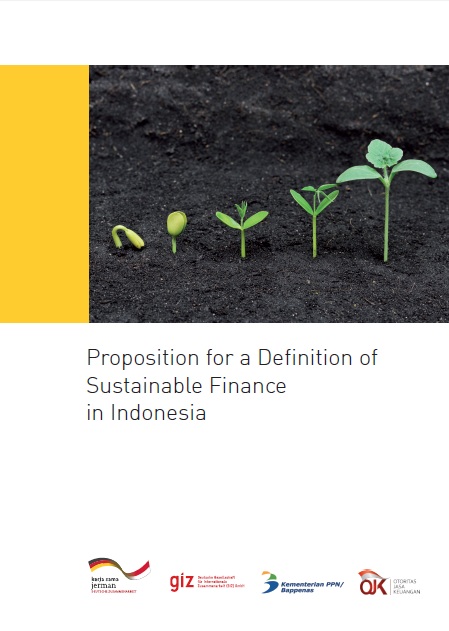Proposition of Definition of Sustainable Finance in Indonesia

Indonesia is one of the biggest emitters of Greenhouse Gas Emissions (GHG) in the world. The Government of Indonesia, here represented by the Financial Services Authority (OJK), would like to encourage the Indonesian banking and finance sector to play a more active role in tackling Climate Change by applying Sustainable Finance instruments. Specifically investments into Renewable Energy, Energy Efficiency, sustainable production methods, and the creation of ‘green’, i.e. environmentally friendly products are in the focus of this initiative.
The focus of this study is to introduce a definition of Sustainable Finance for Indonesia. This definition can be used to provide a first practical guidance on how through ‘Sustainable Finance’ the real sector can on the one hand be supported to become ’greener’ and more sustainable. On the other hand it has a key role to play in ‘greening’ its customer base – domestic companies of all sizes and across all sectors.
This study has to be seen as a starting point of an ambitious political process: the effective implementation of the respective financing instruments and tools in the Indonesian financial services industry. Therefore, the study is supposed to be followed by the development of Sustainable Finance Principles, Sectorial Guidelines and a Reporting System, amongst others. An undertaking of such an inclusive and comprehensive nature requires that all stakeholders involved share a common understanding of the term ‘Sustainable Finance’. It is the hope of the authors that the present definition study contributes also to these upcoming tasks.
On the other hand this study does not aim at covering all aspects of the term ‘sustainability’ (economic, social and environmental) due to the limited mandate and time constraints. It concentrates rather on the ‘green’ aspects. It also can only tap on sectorial developments, constraints and challenges. This would require additional, more in-depth research. OJK is committed to take the next steps accordingly.
The study starts with a literature overview of the different international definitions of Green and Sustainable Finance as well as Sustainable Banking (Chapter 1). This is followed by an introduction of four of the internationally most common ‘Sustainable Finance’ standards and benchmarks (Chapter 2). The aim is to assess the most relevant, currently applied frameworks for banks across the globe. Chapter 3 will then look at the progress Sustainable Finance is making in other emerging economies. This prepares the ground for Chapter 4: here the different aspects of ‘sustainability’ and Green Economy in the Indonesian context are elaborated before a definition of Sustainable Finance and several recommendations are presented (Chapter 5).
Once ‘Sustainable Finance’ is clearly defined and a common definition is agreed upon, it will also be important that efforts of the Financial Services Industry are documented and monitored. Special attention will have to be given on how many loans will be directed towards environmentally and socially sustainable ventures.
For this reason this study includes in the annexes a suggested classification and reporting system which will allow OJK and the Financial Services Industry to monitor the lending practice towards the identified areas of Sustainable Finance. Equally in the annexes the most relevant national regulatory frameworks are presented. Finally this section concludes with a compilation of potential fields and sectors for Sustainable Finance as well as some more disputable – or critical – areas.
The study has been commissioned by the Government of Indonesia, represented by the Financial Services Authority, OJK. It was prepared by the Regional Economic Development Program (RED) as part of the support to OJK under the Green Economy Component. RED is a collaboration between the Ministry of National Development Planning (BAPPENAS) and GIZ (Deutsche Gesellschaft für Internationale Zusammenarbeit) on behalf of the German Federal Ministry for Cooperation and Development (BMZ).